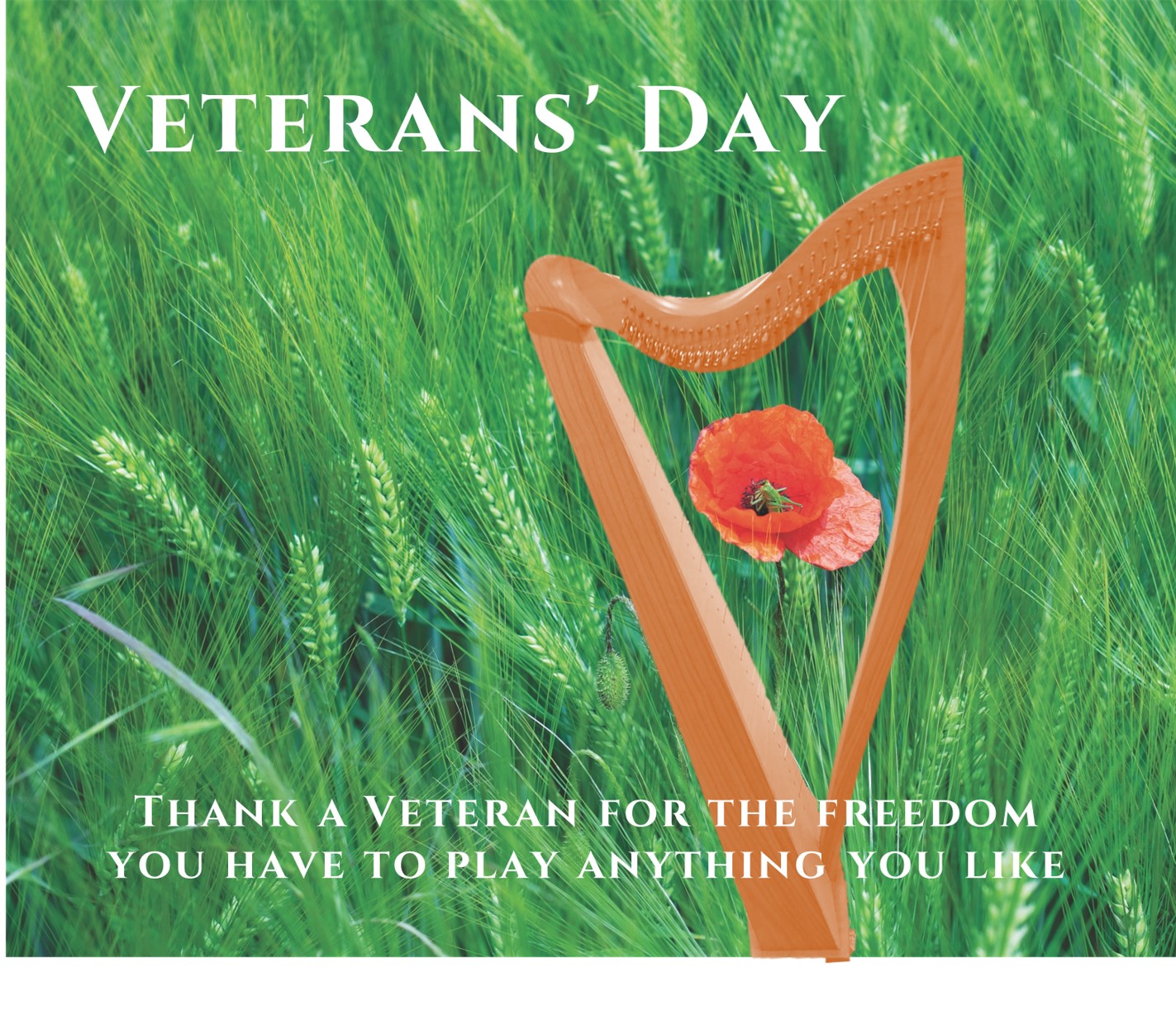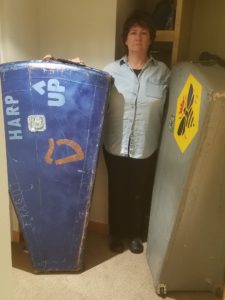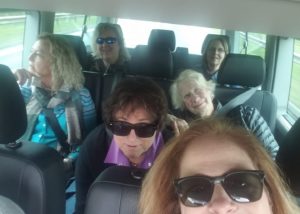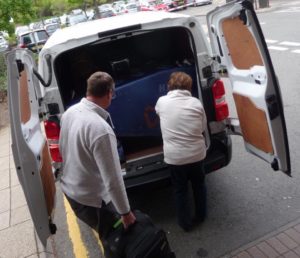Hoping you have much for which to be thankful. Thank you for reading and being part of my harp life. I am so grateful for your presence, your humor, your wit, and sometimes your patience! 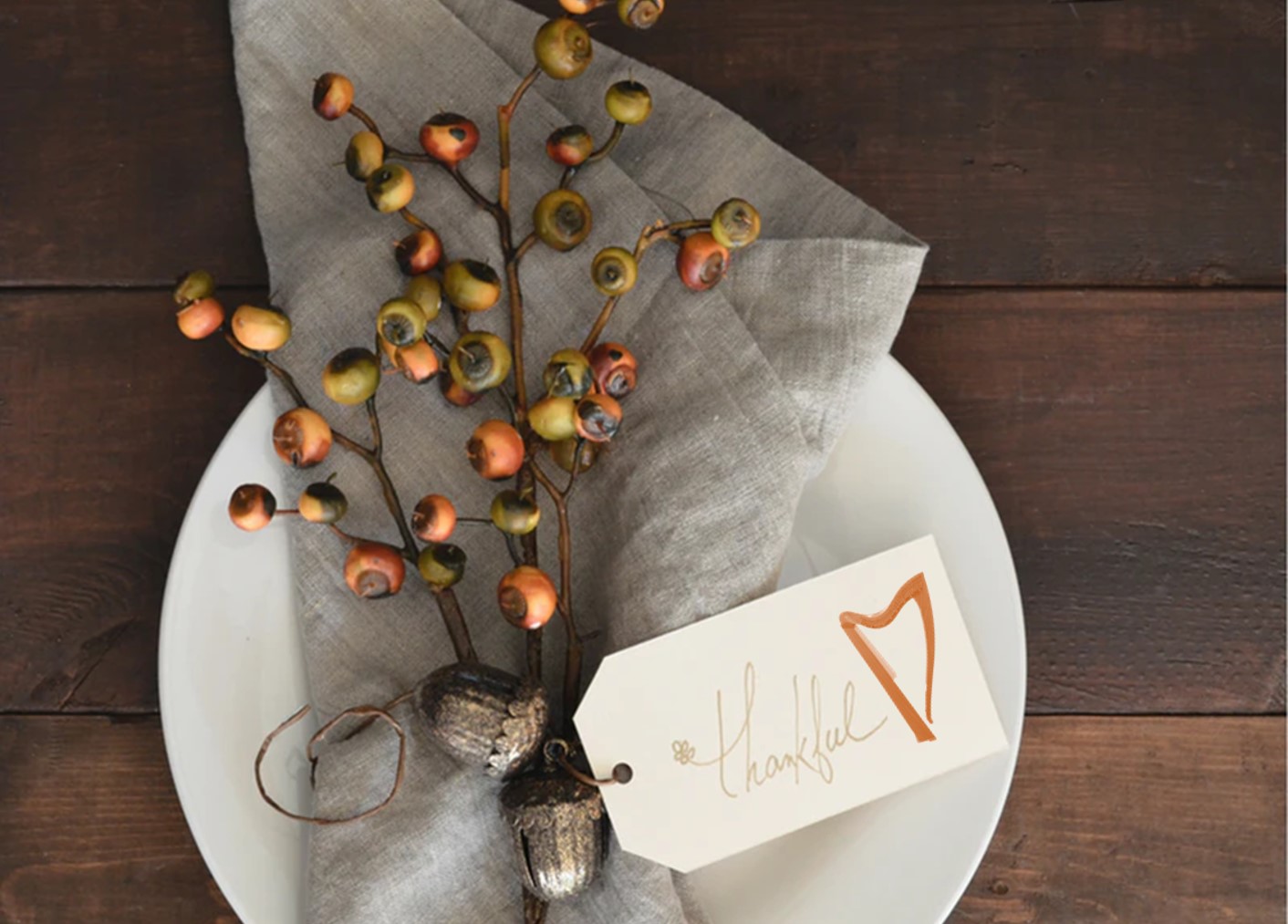 Happy Thanksgiving!
Happy Thanksgiving!
Category Archives: Other
Veterans’ Day
Happy Anniversary! Our 10th year
It’s amazing to realize that I started writing this blog 10 years ago this week! The time has flown by. I started to blog to get the word out about the Harp the Highlands and Islands trips. And here we are, so much later, talking not only about the trips but also about becoming better harpers and learning stuff!
Have you ever wondered how the trips came about? Through serendipity of course!
My first trip to Scotland was to St. Andrews. I didn’t even play the harp then. The weather was horrible – grey, drizzly, much colder that I expected. And then – it snowed. And it was windy and the water looked angry and the beach was bleak – and I l-o-v-e-d it!!
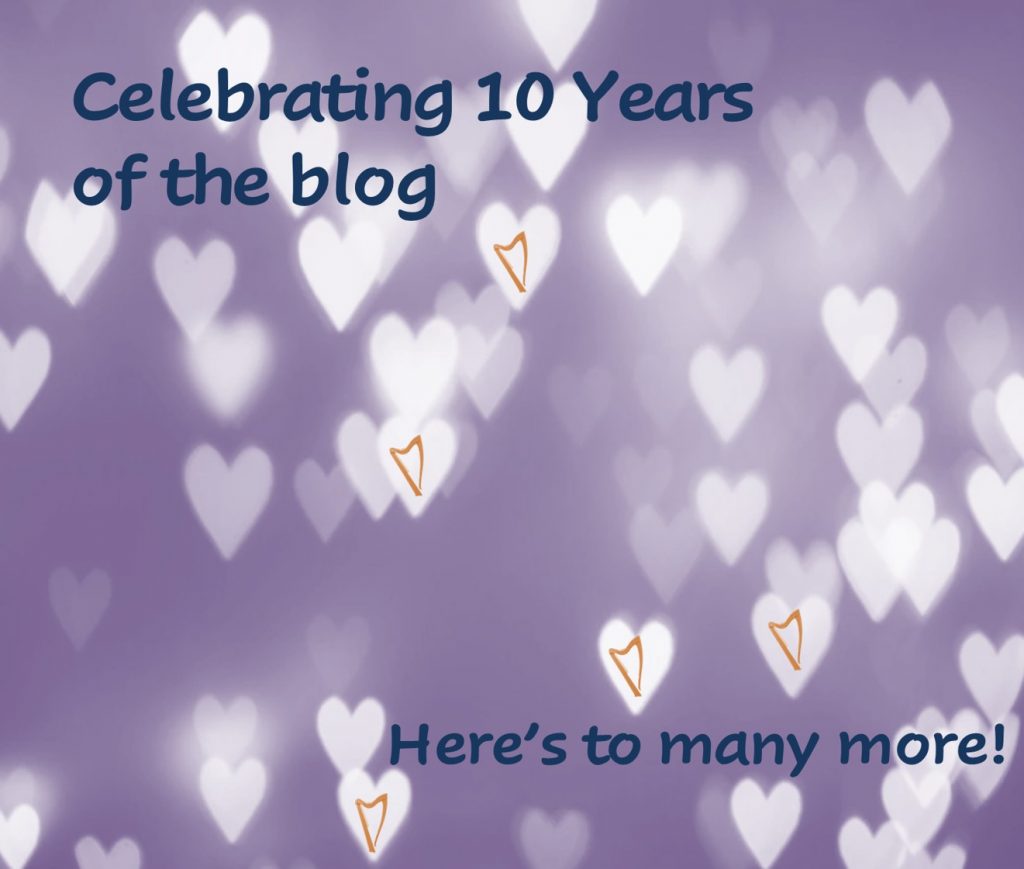 Over time, I went back to visit, getting a better appreciation for the varied areas. And the people, the geography, the history, and the sky – the breathtakingly, achingly beautiful sky! I had a favorite hotel, a favorite B&B, lovely friends to visit, etc. My favorite place was anywhere within 70 miles of the ocean*.
Over time, I went back to visit, getting a better appreciation for the varied areas. And the people, the geography, the history, and the sky – the breathtakingly, achingly beautiful sky! I had a favorite hotel, a favorite B&B, lovely friends to visit, etc. My favorite place was anywhere within 70 miles of the ocean*.
Then I began to play the harp, and after a few desultory attempts at celtoid music, my wonderful teacher gave me a gentle nudge that introduced me to Scottish music. And I found that it was quite possible that I loved the music even more than I loved the sky!
While at the Ohio Scottish Arts School one summer, it hit me (finally) that nearly all the tune names referred to real places, real people, real events. I had just seen Killiecrankie Leap – and was possessed with the need to play the tune Killiecrankie. It was while walking to a meal in Oberlin, Ohio that I was struck by how cool it would be to sit on that rock where the great leap occurred and play that tune!
I wanted to go to all the places and play all the tunes!!
That thought simmered for a few years. I had no idea how would I drag my harp along all those rivers, braes, burns, battlefields, towns’ streets, and through all those castles and stately homes!
In January 2009 I was invited by my dear friend David to play a Burns Supper. It was an incredible event and I thoroughly enjoyed myself. At the end of the trip, on the way to the airport as we chitchatted as friends do as their time together draws to an end and I shared my crazy idea to “play the harp at all the places” with him.
Well, he took those wisps of thoughts and crafted a trip that landed in some great spots by getting off the beaten track to show people Scotland unpackaged – the place I had come to love and not just some glossy brochure “Outlander” paper doll cut out! And he scheduled in time to play the harp – every day! I put together arrangements of tunes that fit the itinerary (and a few extras, just in case) and the trip was born!
We focused on very small groups in a highly curated approach to travel (and we still do). David is an amazing host. I got to meet harpers I would not know otherwise and share tunes I love in locales I adore.
In 2020, we’ll celebrate our 10th year of sharing with you! Perhaps the highest complement is how many people have come back to travel with us repeatedly. In the digital age, I know I should have more photos, but I’m usually too busy being in the moment, sharing with new friends, or making music to take too many photos, but others have done a great job. In addition, our 2020 trip is sold out already! Thank you for joining us!
We’ll keep at it as long as we’re having fun. If you’ve missed us for our 10th year but you want to come along, leave me a comment and I’ll add you to my contact list for the next trip. And lift your metaphorical glass – to our anniversary!
* FYI, no part of Scotland is 70 miles from the ocean!
In the Bleak Mid-Summer…8 ways to stay Motivated
It is the Bleak Midsummer – that time of year when it might as well be winter for all that you intend to go outside! It’s predicted to be about 100o tomorrow – ugh. And raining. The remnants of a tropical depressed (yes, I meant that).
Of course, it will be pouring while I try to load my car to head to Somerset Folk Harp Festival. Why does it always rain when you need to load your harp into the car? It’s just a law of nature I supposed.
 But that’s the thing about the Bleak Midsummer (you might call it the Summer Doldrums, but that’s not bleak enough for me) – the heat, the humidity, the knowing that it will last another eight weeks – all gang up on you and sap your strength and motivation! Who wants to play when you know you’re going to sweat on your harp?
But that’s the thing about the Bleak Midsummer (you might call it the Summer Doldrums, but that’s not bleak enough for me) – the heat, the humidity, the knowing that it will last another eight weeks – all gang up on you and sap your strength and motivation! Who wants to play when you know you’re going to sweat on your harp?
Ugh.
So, how do you stay motivated? Here are 8 ways that might work for you:
- Go to summer harp events! I’m delighted to be going to Somerset Folk Harp Festival and I’m missing all the fun we had at the Ohio Scottish Arts School, and I’m really looking forward to Harp Quest! I wish I was able to fit more in, but these events (and others like them) really help you break out of any rut you might be in, let you catch up with old (but distant) harp friends, make new harp friends, and learn a lot in a relatively short time. Best of all, you come home with new tunes, cool tricks and tips, and usually a bounce in your harp-step! [BTW -There only a few remaining spots in Harp Quest and registration will close soon, so be sure to get in while there’s space! More info here or contact us here]
- Use the long days to your advantage – if you normally practice in the evening, you can use the early light to get a new view on your playing. Never gonna happen that you get up at 5 to practice? No worries – enjoy practicing in the late afternoon or early evening – here too the light is so bright and the sun still so high that it feels like you’re practicing much earlier than you are. Or wait until the lingering sunsets of summer to enjoy the feel of playing the evening in. No matter what, you can use the longer days to get a fresh perspective on your playing.
- Don’t let the short nights get the better of you – be sure you’re still getting enough sleep. Getting enough sleep will not only help you play better but will also help stave off the blues. Those long nights will be upon us before we know it (even if it feels like they’ll never come) but you can still arrange to get plenty of rest.
- It’s VACATION TIME! You can take this a number of ways. You’re going to go away and have a frabjous time somewhere else doing nothing (including not playing). Or you’re going somewhere amazing and taking your harp with your time away. Either way – use the down time to rest and recover. And maybe devote a few quiet moments to reminding yourself of how much you love playing the harp and that the work is just a path to enjoyment. [And if you want to plan ahead – you could never go wrong spending your vacation on a trip with us! Harp the Highlands and Islands 2020]
- Use those long sunny (hot) days to spend time in your favorite chair with your favorite libation thinking about how lucky you are to play the harp! That should perk you up and make you want to play (and maybe even to practice?). Of course, that libation should be part of your hydration plan – it’s so easy to get dehydrated in the summer and that will throw you off your game, sap your motivation, and probably give you a headache – all no fun.
- Think about Christmas – every year Christmas comes racing up and we’re never really ready, so give it a little thought now. Maybe plan out your cold weather strategy while it’s still nice and hot. When will you start? What tunes are you going to add this year? What have you played in the past that needs more work (and inevitably, more than you think)? Where are you going to play? What non-holiday tunes will you keep in the rotation to avoid boring the socks off your listeners? See, there’s loads to think about, while you’re sweating and not wanting to play.
- Just sit for 15 minutes. Promise yourself that you’ll only play for 15 minutes – after all, it’s hot and you won’t be able to concentrate for too long, so don’t think you will – just do it in bite sized chunks throughout the day.
- Have ice cream. Really? You’re going to question this? Fine, I’ll have yours.
Power through – it’ll be autumn soon and before you know it, we’ll be complaining about how cold it is! There’s eight ideas – do you have others? How do you stay motivated throughout the summer? Leave me a comment and share!
Travel is Broadening
You already know that all of us are back from the Harpa Scotland 2019 Retreat. If the photos, videos, comments, and smiles are any indication – it was another brilliant success. Harpa is so much fun because it has a simple formula:
HARPA =
amazing musicians + fantastic tour guide + incredible roadie =
sharing music joy + enjoying each other + adventure!
You’ve heard the maxim that travel is broadening – and not just from delicious cakes and scones! As you travel with your harp, you develop or hone many sterling qualities including forbearance, faith and patience! Whether you like it or not, you must let go, trust the Fates, and be patient (outside the “Oversize Luggage” belt mostly!).
Most of us are control freaks (especially about our harps). Many of us do not know this about ourselves (or if we do, we underestimate). Few things will test your mettle like traveling with your instrument and entrusting it to the TSA. And while American (airline) may hate guitars, I’m pretty sure it’s the TSA that hates harps. Or at least, hates harp cases. I qualify this, though, to say that although I have gotten my harp back partially latched or completely unlatched, it has always weathered the journey (Forbearance? Faith? Probably both).
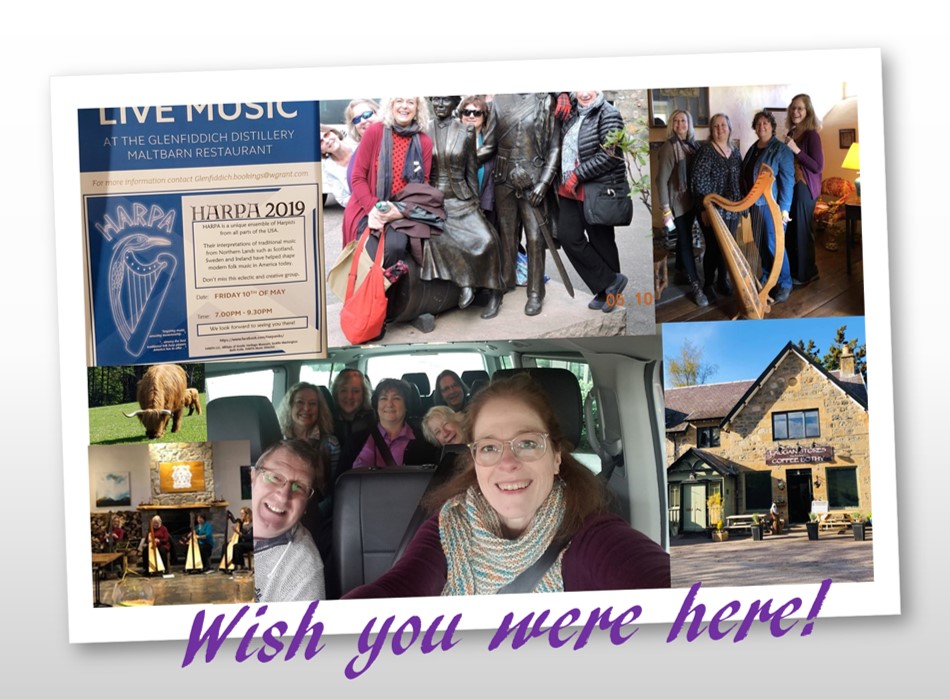 But more than that, traveling with your harp opens doors you might not even know were there otherwise. We have been places we likely would have gone right by – simply because those places opened themselves up to the possibility of us playing there! We have never played anywhere dull. This openness on their parts helps us to be more open on our part – to see new things or to see familiar things differently (including toilets, refrigerators, and door locks!). And once we are opened, adventures appear around every bend.
But more than that, traveling with your harp opens doors you might not even know were there otherwise. We have been places we likely would have gone right by – simply because those places opened themselves up to the possibility of us playing there! We have never played anywhere dull. This openness on their parts helps us to be more open on our part – to see new things or to see familiar things differently (including toilets, refrigerators, and door locks!). And once we are opened, adventures appear around every bend.
Our trips are always small – this time we had seven. This allows us to go places often overlooked or bypassed. It also ensures we don’t travel as a band of tourists – simply observing, never venturing outside our comfort. But it also generates a community and engenders sharing with one another – we gel in ways that big groups never get. We become a traveling family, if ever so briefly. We share our experiences – and our cookies! And that sharing is part of the fun. And the more fun we have together, the more fun we find. And so it grows!
But perhaps the best bit is that we meet other people – in restaurants and cafes, at attractions, in our accommodations. We were invited along to a stramash by someone we met at one of our concerts. See how that works?! At the time we weren’t sure we knew what a stramash is, but we kinda thought we did, and we went along to it. It was a blast! We got to play tunes with local musicians, we heard some new ones, played some shared favs and heard some lovely singing. We got to share the joy of making music – in a fun, organic, very Scottish way! (Just to confirm, a stramash is a seisiun). We met a delightful couple at a fish and chips restaurant…because they photo bombed one of our group selfies! It is these brief interactions punctuating the trip that not only make great memories, but really define good travels. While chatting with an audience member we learned of a museum that none of our research had unearthed. And later, once there, we met and chatted with more lovely locals and learned more than just looking at some displays would ever have wrought.
All that leads to learning more about yourself. You learn where your unknown assumptions and ignorances lie and have the opportunity to examine them. These assumptions and ignorances are not good or bad, but examining them means you can rethink their utility. I’m not talking about bigotry but rather biases like what we select for our concert program, how we introduce ourselves and our music to the audience, and how we meet them where they are when we perform (and appreciating when they’re not where we thought they’d be!). A small group also learns to accept more – the morning person must be patient while the not-morning person strives to not be cranky at the start of the day (and vice versa at the end of the day). We help one another – with luggage, and art supplies, and fingering, and leftovers, and making tea (and more tea, and yet more tea!).
And best of all – each trip is different. The harp attracts all kinds – players and appreciators and audiences. We make lifelong friends and brief – but enriching acquaintances. Even if we return to a place, it is new, and we grow in it. And being invited back is a pleasure and a privilege.
So Harpa 2019 is in the books – an unqualified success. We’re all home, laundry cycled (mostly), gifts given, postcards received (mostly). And we look forward to the next time!
Once we sleep off our jetlag, we will start planning the next Harpa outing!
But we’re also finalizing plans for the 2020 Harp the Highlands and Islands trip – details coming soon. Would you like to be broadened (by travel and cakes)? Want to be part of the action and first to know the details? Leave me a comment to that effect below!
PS: Photo credit for this week and last go to the Harpaniks and especially Donna Bennett, Therese Honey, and Robin Pettit.
Harpa Retreat 2019 has begun!
Harpa 2019 has started! We have all arrived in Scotland and are already having a blast. We are seven this time – five harpers and two appreciators, as well as David our intrepid guide and Heather, our harp-playing roadie. We are significantly missing our lead Harpanik. Beth Kolle, who founded Harpa, is home recovering from a demonstration of gravity and we are missing her terribly. But we press on, carrying the Harpa flag!
This year we decided that we would benefit from a “vacation from our vacation” type trip and began developing the Harpa Retreat concept. We came to Scotland because – well, Scotland!! We have two concerts for different charities scheduled. And we’re planning on more down time so we can really savor our time here, make art, jam and really enjoy each other musically, and just breathe. Because that can be the problem of a vacation – you go somewhere interesting, that you want to see and soak up, and share with friends, and really experience, and you spend some short but manageable time there. But you’ve spent a lot of money to get there and you want to see it all! And you really do try, but you can’t succeed and you get very tired trying! And worst of all, in all that trying, it’s easy to miss the very thing you went there for. So this year, we are trying to take it a little slower, to chill a little. So far it’s been a great idea!
We have just started yesterday and we have an amazing group. Our performers are Sue Richards, Therese Honey, Martha Hill, Donna Bennett, and me. Sue, Therese and I started a little early in Glasgow so we could meet some of the members of the Glasgow Branch of the Clarsach Society and share a workshop (which was just an incredible day – thanks to Gillian Fleetwood for making that happen!), see some great museums, and ride trains with harps.
We took a Preparatory photo to help explain to taxi people what we were looking to get into the cab . It didn’t help the planning, but was fun to take. Photo by Therese Honey – who is a much better photographer than I!
Why yes, you c-a-n get two harps into a cab, onto a train, still have fun and enjoy the ride! Another Therese photo – she’s good about taking them!
We all met up in Endinburgh and yesterday we set off on another adventure.
And yet another photo from Therese – she finds the best photos – just the way she looks at the world is amazing! We had the easy job. David and Heather had to figure out how to get the harps into the vehicle – puzzle for the day.
We have been posting photos on Facebook here and on the FB Harpa group. Wish you were here! More later, we’re busy having fun! Wish you could see Scotland through a harp? Leave a comment and let me know!
PS – just like if you have more than one harp, you have a favorite, I have a favorite computing device…and I chose to travel with the other one, so please forgive any errors. I’m blaming them on the #%~*^ ipad!
Permission Granted x20
Playing the harp is more challenging than it looks. You already know that. That’s why we work hard during practices. It’s why we try to practice regularly – so that we enjoy small, incremental improvements each day. And this is one reason I’m always suggesting that we track our progress – to acknowledge, accept, and grow from that practice.
Practicing certainly gives us a way to work on the technical aspects of playing, but there is so much more to playing – things that go beyond the technical. However, to get to those things we sometimes need to get out of our own way.
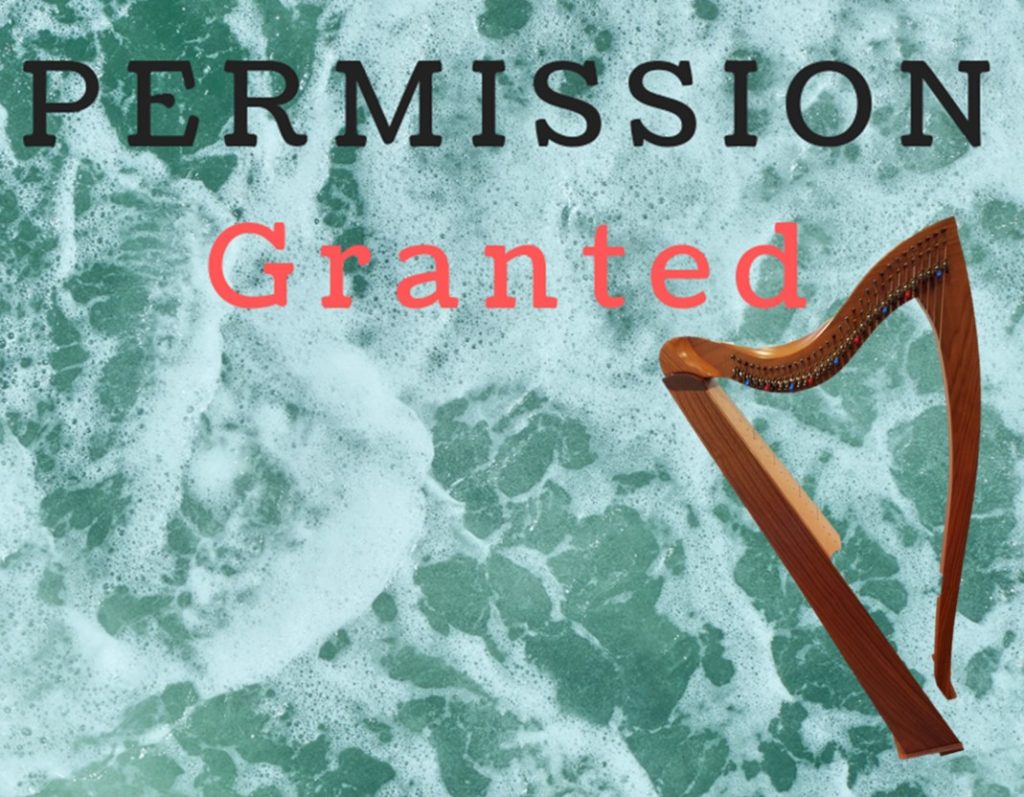 So, how do we do that? We start by giving ourselves permission. Permission for lots of things. But mostly, you have to give yourself permission to be YOU!
So, how do we do that? We start by giving ourselves permission. Permission for lots of things. But mostly, you have to give yourself permission to be YOU!
Here are 20 types of permission you might consider giving yourself:
- Permission to fail. It happens. Actually, if you’re learning, you’ll fail a lot on the way. But if you refuse yourself the opportunity to fail, you won’t learn…and that would be a shame.
- Permission to be silly. There is so much seriousness in music, but a little silly will probably help you enjoy more.
- Permission to give it rest. Sometimes you need to percolate – and taking a little break will give you the option to do just that.
- Permission to be as good as you are (and no better). You are where you are. Be there.
- Permission to work on just one thing (until you get it right). Sometimes we think we have to master everything, all at once. But this doesn’t really do much except frustrate you.
- Permission to do scary things. When you scare yourself, you learnt that it didn’t kill you to try something new. We’re usually most scared that we will embarrass ourselves – you’re going to embarrass yourself one way or another, so embarrass yourself your own way!
- Permission to get out there and share. We often huddle in the safe cocoon of our harp room at home. But the music is best shared – so get out there!
- Permission to fail again (and again and again and again). You can’t just stop at one failure – do it over and over and over – and each time you’ll learn more that you can apply to the next failure.
- Permission to make art in multiple ways. This can be as small as playing a new kind of music or as big as learning to sculpt or paint or write. All your art will work to help you in the others.
- Permission to create “first drafts” (and second and third and on and on as needed). You know that what you see on stage or on YouTube is not spontaneous, right? So why do you expect your initial efforts to be performance ready? Think of the pre-work as your “drafts” that you will continue to refine and develop – until they are ready to share.
- Permission to have fun. Ok, this is pretty self-explanatory!
- Permission to laugh at yourself. No really, you should be able to laugh at yourself. Keep it light – it’s not rocket surgery after all.
- Permission to expect more from yourself. You don’t have to be content with your lot – you can want more (as long as you’re willing to work for it).
- Permission to be good at some things, not good at some others, and even to be terrible at a few. Here’s an example – I’m good at playing the harp, I’m not as good at cooking and I’m terrible at gardening. I’m ok with that – I allocate my time and resources accordingly (e.g., I practice for hours, I heat soup for dinner, and I pay a kid in the neighborhood to tend the garden – that’s that sorted!).
- Permission to practice as much as you need – and no more. I know some of you struggle to get your butt on the bench, but others spend too much time there – practice while it’s productive, and then go do something else. Got a deadline? Try a little practice multiple times in the day.
- Permission to be happy with where you are. This might seem counterintuitive (or counter to development) but it’s not – you are where you are. Be there. Right then. Realize too that time is a river – there is only constant change and you are changing when you are where you are – give yourself permission to accept that.
- Permission to want more. You think I’m contradicting myself – but remember I said there is constant change – if you want more, want it – and work for it!
- Permission to change your mind. Playing classical music and tired of it? Trapped in session tunes but longing for something more “substantial”? OK. It’s ok to change your mind about what you want to play. Just do it.
- Permission to keep track of what you are doing…and what you want to do next. However, you need to – keep track in your own way and build on that.
- Permission to spend your valuable time doing what you love. After all, time may be your most precious commodity – so spend the time you have doing what you love.
There are plenty of permissions to give yourself. What other ones do you give yourself (or do you need to give yourself)? Share that in the comments!
First Day of Spring – Get outside!
No matter where you live, the first day of Spring can be a wonderful day. The farther you are from the equator (and whether you have Spring in March or September), Spring portends change and newness. Although I grew up near enough to the equator that Spring is just another day on the calendar, I now live where Spring occurs very palpably. And although it is my least favorite season, I still very much look forward to it’s arrival.
Here we are slowly transitioning from winter, and just now we are enjoying a faux May day. Of course, we’re not quite there yet and we will be returning to our regularly scheduled March in just a few hours. But for the moment, it is Spring. And it’s a perfect day to take get harp outside…and play!
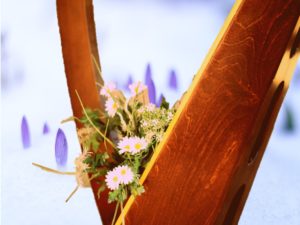 There are all kinds of reasons to take the opportunity to do it right now!
There are all kinds of reasons to take the opportunity to do it right now!
- The fresh air will do you good. There’s a reason “Spring Cleaning” is a thing. We have been cooped up in furnace air for months, so a little fresh air will be a welcome change (and you also want to enjoy it before A/C season shuts you up again).
- The sunlight will do you good. This is a perfect time – bright clear days while the sun angle is changing – it’s not beating down on you or your harp. No sweating on the soundboard. No worrying that the glue might be in jeopardy. Research keeps showing the importance of getting some sun – to collect Vitamin D precursors, to stave off the winter blahs, and to put the finishing touches on your adaptation to the time change. Playing your harp will only enhance all that.
- The warmth will do you good. Some research suggests that you will feel better with just 15 minutes of contact with the earth each day. When it’s Spring, it is warm enough to take your shoes and socks off and keep your feet on the ground. No matter how it operates, taking 15 minutes to stand still (or sit still) will do you good.
- Being present will do you good. Sometimes when we take our harps outside, we are worried – will the harp be stable? will other people hear me? does anyone see me? We might feel exposed with our bare arms and our bare harp. But that’s not the point. Instead – be present. Enjoy the feel of the wood, the strings, the air, the sun, the deck/park/garden/yard in which you are sitting, the breeze, the sound. Be present and remind yourself how much you enjoy the feeling of playing – no matter how experienced you are (or aren’t).
Spring is a great time to remind yourself to be thoughtful. After the bundled up, flurry and flutter of the holidays and the start of the new year – take a breath. Be here. Now. Enjoy your harp.
Go play now. Spring is fleeting. Soon it will be Summer, with its hustle and bustle and A/C and harp events! Ok. Gotta go – the deck is calling me, the trees are beckoning, the birds are off key so they need help. Where will you play? Let me know in the comments below!
We’re all made of Stories – The Comparison Trap
We humans observe…and then compare. We are always collecting data about the world around us, analyzing it, and then selecting a winner. We have a classification scheme for winners and not winners – so we see where we rank in there.
This comparison trap is insidious in two ways. It assumes that you are an unbiased (and knowledgeable) arbiter of truth and it rarely takes context into account.
And typically, when we make comparisons, we find ourselves wanting.
Finding yourself wanting is not motivating.
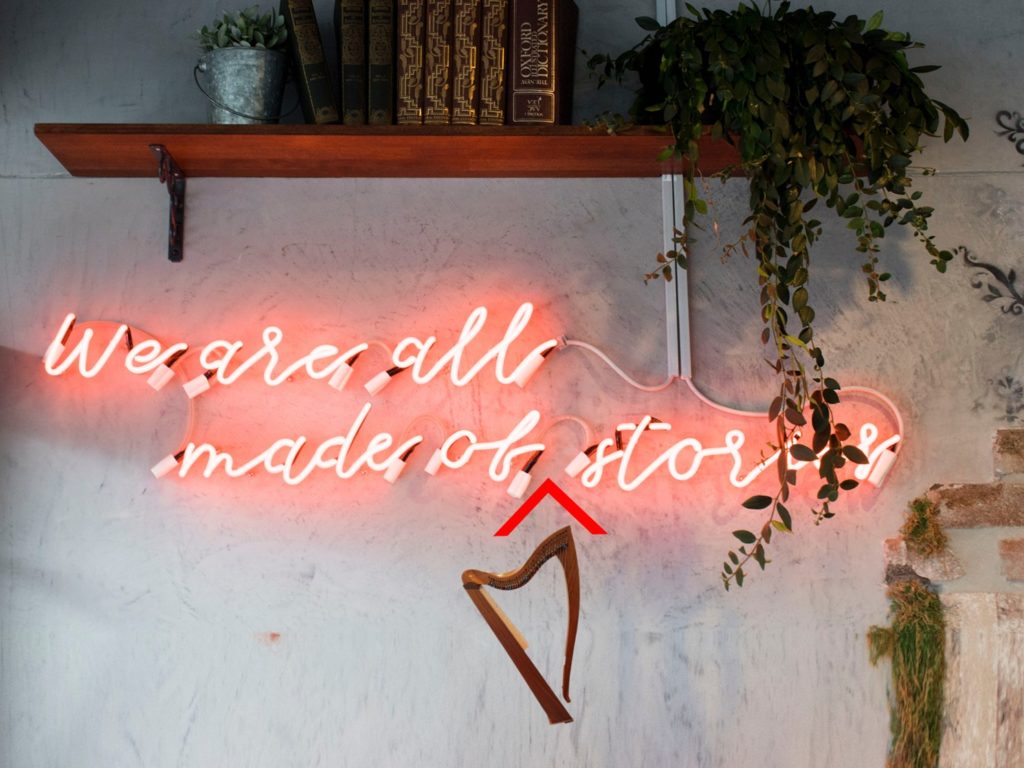 Are you a “Fair Witness” *? Are you certain that you are qualified to critique the performance of others relative to your own? And can you say, perhaps with more certainty, that you are qualified to evaluate your own performance – clear eyed and unbiased? Are you a Fair Witness to yourself that you can only report the truth with no trace of bias? Likely not – you have a vested interest in the outcome, so be honest about your ability to assess.
Are you a “Fair Witness” *? Are you certain that you are qualified to critique the performance of others relative to your own? And can you say, perhaps with more certainty, that you are qualified to evaluate your own performance – clear eyed and unbiased? Are you a Fair Witness to yourself that you can only report the truth with no trace of bias? Likely not – you have a vested interest in the outcome, so be honest about your ability to assess.
I just learned that my sister writes poetry. I learned this while thumbing through an anthology in which she is published! This very clearly highlighted the second point of context. You very rarely have insight into the context of others (even in a close relationship). Even though we are all made of stories – we don’t tell them all to everyone. And there are some we tell no one. In addition, many have no insight into the context of themselves, much less that of others. And even if you know someone, you might not have an accurate view of their context.
On occasion, you’ll hear someone “praise” another by stating baldly that playing the harp comes easily to (another). I find this both horrifying and irritating. You might think you should be delighted to receive what might be meant as a compliment. But because you have worked quite hard to be where you are, and even if you give the illusion that it comes easily, you might rather be annoyed that someone has discounted all that hard work. When you compare your own playing to someone else’s (or someone compares themselves to you), you never know the entire context – where they are, what is happening, or how your comparison may upset them. By the same token you may not be fully aware of how things affect you and impact your own playing.
As the trope goes (did you know that “trope” originated as a music term?) Comparison is the thief of joy. Why do we make comparisons? Because we’re good at it. We are quite adept at making pairwise comparisons (choosing a preference between two options). There are entire lines of research built on these comparisons – we’re that good at making them! But in this case, our strength (comparison) is a real weakness – because, you don’t have to pick! Someone else can be good and you are still too!
In addition, comparing yourself to someone else is more likely to make you feel bad than to make you play better (and you can see how that’s not helpful – the comparison makes you feel bad, so you’re not motivated to practice, so you do not become better (and may lose ground), which makes you not play as well the next time you’re with others and your comparison results in your poorer showing – etc.…you can see how that’s a downward spiral of not very helpful).
At a recent workshop I overheard a relatively new harper wistfully comment, “I’ll never play as well as (insert significantly experienced, p-r-o-f-e-s-s-i-o-n-a-l harp player here).” ** Well, DUH! Of course you don’t! You’ve been playing the harp for 10 minutes and they’ve played for 20/30/40 years. You dabble, fit it in, get to it when you can, as a hobby. That person is a pro – it’s their job! And they are seasoned, they work at it – you know, for hours – every day. And they are absorbed in multiple aspects of being a musician, not just the practicing for 20 minutes when they can!
Of course you don’t play at the same level! When I overhear this, I am always tempted to ask, “Do you w-a-n-t to play at that level? Or do you just wish you played at that level?” Big difference! (of course, the start of the difference is – you know what I’m going to say – practice!)
Do you say to every Dentist or Auto Mechanic you meet, “oh, I wish I pulled teeth or rebuilt transmissions as well as you”? Bah! No, you don’t, so why do you do that with harpers? (and if you do, stop, you’re creeping people out!).
But how can you escape the Trap and emerge solid in your own story (and possibly helping other people grow fully into their own stories)?
Be honest – and clear – about where you are and where the other person is (and the path from here to there). And be frank about your willingness to take that same path (or not)!
Be content, but not complacent – You are where you have gotten. You are not your harp hero. But you might be someone else’s (did you ever think about that?). So kindly and gently encourage yourself to continue to work and grow. You already know that it is work to continue – but it’s fun work! And there’s no deadline, so just keep at it.
Be analytical (but only part of the time) – note how much you have grown as a harp player. No, really note – be aware. At one point you hadn’t even touched a harp – and look at you now! One of the reasons I’m always exhorting you to keep a journal of your practice is so that you record (and therefore don’t forget and can review) your small, “every day” successes! Because those small accomplishments are what matter.
Be-YOU-tiful (stolen from a tea towel!) – you are amazing! Be that. You have strengths and weaknesses – just like everyone else. Celebrate your strengths. Be mindful of your weaknesses. Work on those weaknesses you want to be stronger at, set up systems to support the ones you know need work (but are still working on), and forget the rest. If you have to, turn your picture upside down so the weaknesses are in fine print at the bottom rather than in headlines at the top of your page.
There is one comparison that does matter – how are you now relative to you previously? Are you growing? Are you becoming the you that you want to be (not wish – but want). Do your thing. Let everyone else worry about being them. Do you have another way of keeping your thief of joy in check? Share that in the comments!
* If you haven’t read this, you might enjoy it – at your local library or at online
**I have no problem making this claim since I hear this at nearly every workshop I attend.
Let the sun shine!
It’s early March and so here in the US, whether you agree or not, it’s time to set the clocks ahead – it’s Daylight Saving Time. Yea.
It’s not really all that bad. It does lead to “longer” days, in that, while the sun is up as long as it is going to be each day, the clock pushes us to use more of it awake. So it feels like we have more daylight than we do. So then the question is – what are you going to do with all that sunlight?
Well, you could use it to play your harp more! And like anything – there are bad things but also good things about moving the clocks to take advantage of the sun.
What are the bad things?
You have to get used to it. Your body is not wired to make these jolting shifts and it might take you a little time to adjust. If you don’t want to experience a wrenching difference, you could take a few days to prepare yourself – go to bed, eat, and go for a walk 15 minutes early each day from now until Sunday – that will help ease you into it. If you can’t work this shift into your schedule, at a minimum, keep to your current schedule so that you are only adapting to one hour change (sort of like jet lag!).
Everyone’s health takes a ding. Research has shown that there are more of all kinds of accidents – car, industrial, just being dumb. But also there are more heart attacks and strokes for the first week of the time change – so take care of you! Eat carefully, sleep, and take a little exercise (use all that extra daylight to go for a walk!).
Then add your harp into the mix! Now you can look at the good things –
First, acknowledge that although the time change can be a bother, you will adjust in just a few days. So cut yourself some slack. Be nice to you – don’t do a lot of forced or concentrated practice. Instead, just play and allow the sound energy to envelop you – all that vibroacousticness might help you adapt (well – it can’t hurt!).
After the first week of adaptation – you’ll be ready to use all that glorious sunlight to be more energetic – you can apply that energy to your practicing. Practice in natural sunlight. Go outside (as I write this, it’s about 20oF so that idea might have to wait!) or open the curtains and play in the window. Just take the opportunity to enjoy the sunshine!
You can let the beautiful lengthening days be an inspiration – make music, play music, share it with others! Can you compose an improvisation of the day, the transition from night to day or from day to night? It’s in you – let it out!
You may enjoy playing more. Sunlight helps combat any kind of “blahs”, so if you layer that over the joy you get from playing – you’ll be nearly euphoric. Keep that up for the eight months of DST and you’ll be…happier? Probably!
You’ll have more time to practice. Of course you won’t. But you’ll feel like you do. When the day is unending – you can practice in the morning, in the middle of the day, and in the evening and still have loads of day remaining.
So there are good things about changing the time for the spring. Layer that on top of the gentle flow of time here on earth, longer days, warmer days, an uptick in harp events everywhere (!) and it just doesn’t seem so bad. Spend a little time preparing this week and you’ll have eight months of enjoyment (before we have to get ready to go back again in November!).
PS – I’m trying to mix it up with the graphics – let me know what you think! Leave a comment below –

